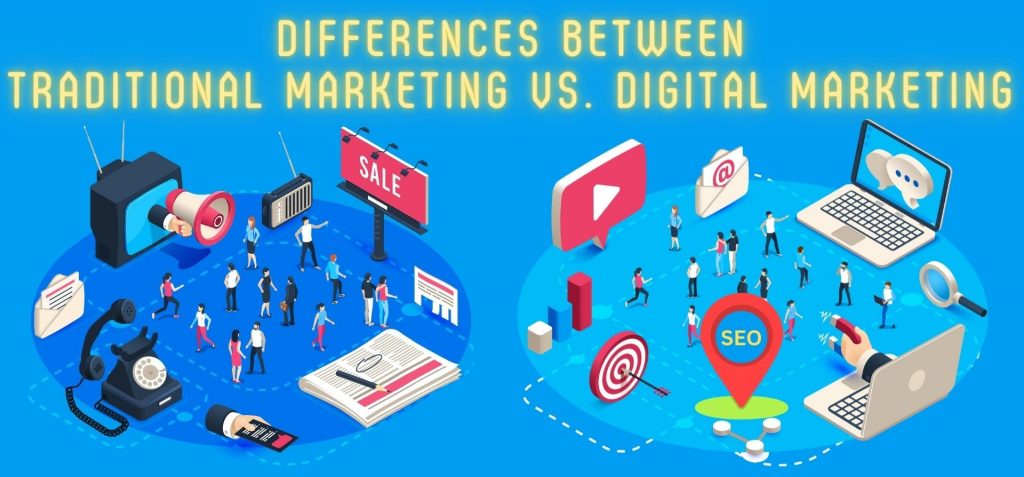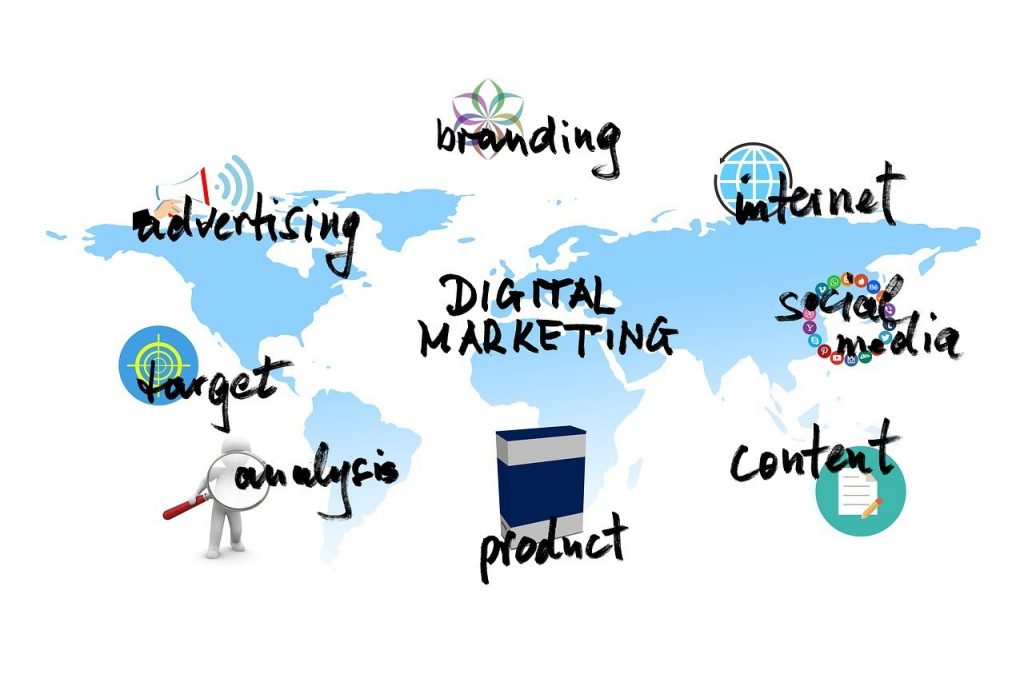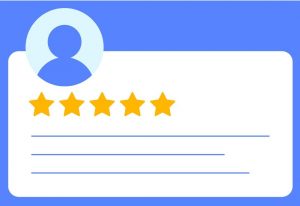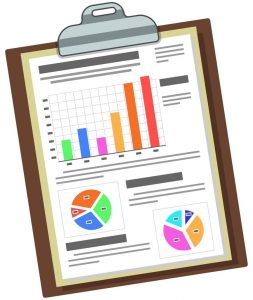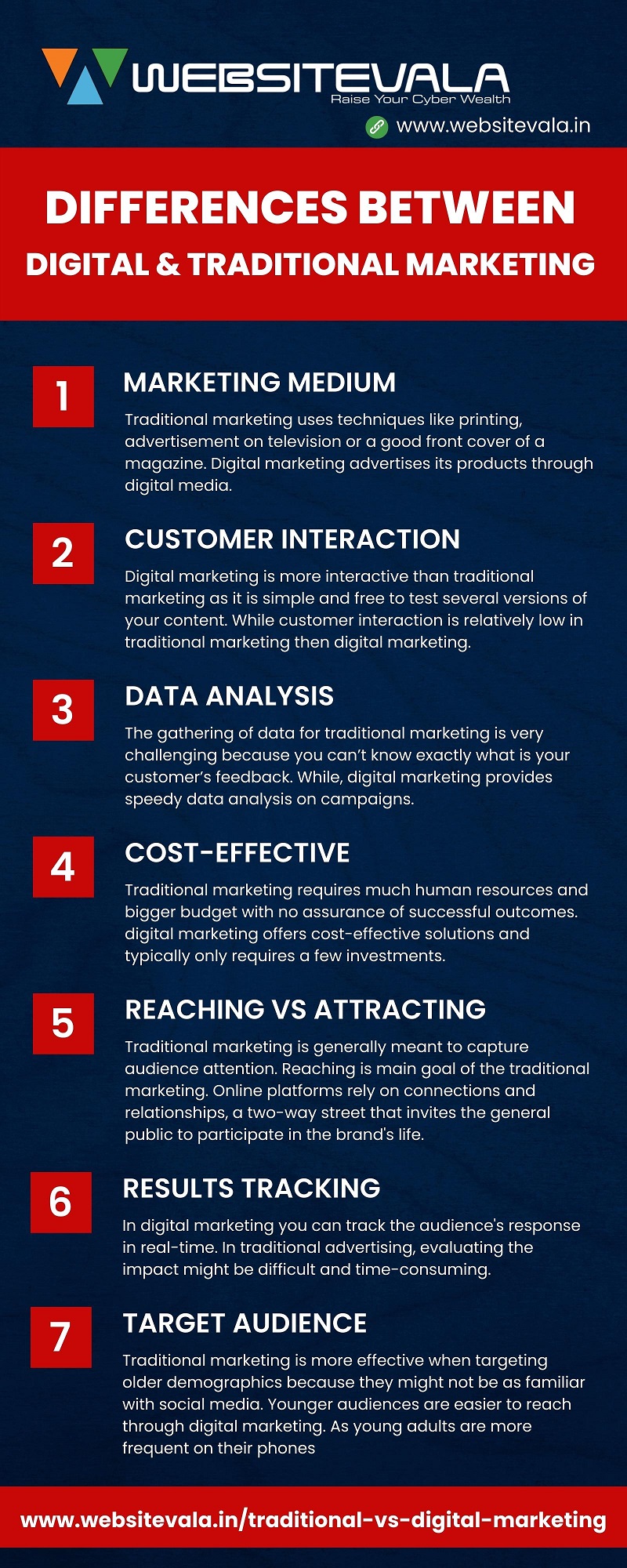Jump Directly to the Topic of Your Interest
ToggleThere are numerous ways a firm can use to attract and captivate its audience’s attention. One such strategy that serves as a crucial part of an organisation is marketing, which makes it possible to win over clients’ engagement.
There are mainly two options: Traditional Marketing and Digital Marketing. The discussion about which is better or which one should be made a priority as a comparison to the other is quite subjective and depends on various factors. But an effective, well-balanced marketing mix makes the most of both for the best outcomes.
In this blog, we will compare Traditional Digital Marketing and Digital Marketing in-depth and evaluate each strategy based on its potential and outcomes.
Get the digital marketing vs traditional marketing Infographic here
What is Traditional Marketing?
Traditional marketing represents marketing activities which are done offline without the use of the Internet. If you have seen a print advertisement or ads on your Tv set, you are subjected to traditional advertising techniques.
It also refers to any marketing endeavour that excludes the use of a digital platform. Although traditional marketing has been around for a while, it is becoming less and less famous as digital marketing gains popularity.
The various pros and cons of traditional marketing are listed below:
Pros
Reach the local intended audience
By marketing on FM radio and local editions of newspaper articles, you can quickly reach out to potential customers in a specific city.
Save hard copies
Your intended audience can keep hard copies of your advertisements, like brochures and print ads, which they go through repetitively.
Easy to Understand
This method can be used to communicate with anyone who does not have access to the internet, and as people have been using it for a while, they are more familiar with it.
Cons
Less engaging
This is a more passive form of marketing with minimal actual engagement. It includes providing the customer with information and expecting that they will purchase.
More expensive
Advertising in the newspaper, radio, and TV can be very costly; therefore, TV ads only last for a few seconds!
Difficult to measure ROI
It isn’t easy to measure how successful your marketing campaign was, as traditional marketing doesn’t have many statistics to measure.
What is digital marketing?
Digital marketing refers to utilising various internet-based approaches to reach a target audience.
These techniques are SEO, email marketing, content marketing, SEM, SMM, video marketing, display advertising, e-commerce marketing, influencer marketing, and paid search marketing.
The various advantages and disadvantages of digital marketing are as follows:
Pros
Global reach
Online marketing has no geographic restrictions, unlike traditional offline marketing. This creates possibilities for quickly and cheaply developing international marketing campaigns.
Personalisation
Online marketing makes it possible and simpler to personalise your marketing messages than conventional marketing, where it is nearly impossible.
Improves conversion rates
Traditional marketing requires customers to complete various interruptive activities such as travelling to a shop, making a call, etc. in contrast, online marketing is seamless and coherent.
Trackable results
Measuring your digital marketing with analytics tools and other online metric tools makes determining your campaign’s effectiveness simpler. You can gain comprehensive information about how clients use your website or react to your advertising.
Customers’ Convenience
You can operate an online business round the clock without worrying about your work schedule. In contrast, the clients can also buy the types of products at any time throughout the day, without having to visit the shops.
Cons
Security and privacy issues
Security is a primary concern when it comes to digital marketing. Companies need to protect customer data. Clients who aren’t confident that a company or brand doesn’t care about their data protection won’t interact with it.
Inaccessibility
Although digital marketing gives companies a global reach, not all areas or people worldwide are reachable through it. Digital marketing cannot reach people who are uneducated or elderly and do not utilise the internet.
Reliance on technology
Online marketing depends on technological tools, the internet, and smartphones. Thus, you must invest in them to engage in online marketing.
Digital Marketing vs Traditional Marketing: Top 7 Key Differences
1. Marketing medium
The marketing medium will be the main difference between traditional and digital marketing.
The state of technology was not as advanced in the past as it is today. To attract an audience, traditional marketing uses techniques like printing, advertisement on television or a good front cover of a magazine.
Digital marketing advertises its products through digital media. As digital media is widely available, most consumers will view the advertisement and potentially buy the services or products.
2. Customer interaction
Digital marketing is more interactive than traditional marketing as it is simple and free to test several versions of your content. A/B testing, also called split testing, comprises dividing up groups, such as your email list signups and social media followers, and delivering the groups various versions of the same content. It can be an email message with different colour schemes and logos or an advertisement of the same product but using a different image.
This testing can demonstrate the variations in clicks and conversions to determine what your consumers are most likely to click on and purchase.
In traditional advertising, receiving feedback on how current and potential customers receive different print or TV ads may be costly and time-consuming.
3. Data analysis
Analysing how well the used campaign worked is crucial. The time it takes to see an effect from traditional marketing can be weeks or longer. For instance, you can’t know how many people viewed a billboard advertisement on the road. Or if it encourages them to purchase your product. To see the results of their analysis, you must run the same advertisement for longer. The gathering of data for traditional marketing is very challenging.
When it comes to data analysis, digital marketing provides speedy data analysis on campaigns. This will be useful for learning what is working and whether anything needs to be changed. You can identify which campaign the consumer responds to better based on your data analytics techniques.
4. Cost-effective
The necessity for several human resources in traditional marketing may be a significant financial commitment with no assurance of successful outcomes. In comparison, digital marketing offers cost-effective solutions and typically only requires a few investments.
For instance, an advertisement submitted to a newspaper for publication will only be successful if the audience responds positively to it on the day it is viewed. On the other hand, a good website can be a great endorsement for the target audience, ensuring that they visit for years without incurring additional costs. Furthermore, compared to digital-driven marketing, broadcast ads and print media are much more expensive.
5. Results tracking
What distinguishes these methods is watching the audience’s response in real-time. Think about a television ad. How can you find out how many individuals saw it particularly? What did they do after seeing it? What impressions did they have of your company and your products?
In traditional advertising, evaluating the impact might be difficult and time-consuming. However, it is much easier in the case of digital marketing. With a well-organised campaign and strong Key Performance Indicators (KPIs), you can test different strategies simultaneously, keep an eye on multiple channels, and figure out which works best for your business.
You can also monitor trends and perform numerous benchmarks to find new opportunities to draw leads and increase sales.
6. Target Audience
Digital marketing and traditional marketing have separate kinds of audiences. Traditional marketing is more effective when targeting older demographics because they might not be as familiar with social media. Additionally, flyers or billboards will be a good choice if you’re trying to reach a local audience.
Younger audiences are easier to reach through digital marketing. As young adults are more frequently on their phones, they will be able to see the advertisement through social media. If you wish to market your brand globally, digital marketing is more helpful and effective.
7. Reaching vs attracting
The perspective of what it takes to succeed varies significantly across traditional and digital marketing platforms. Going for your leads is more effective than waiting for them to approach you. Traditional marketing puts the brand out there by implementing ways to quickly capture the audience’s attention. They need to impact and leave their mark every time an ad is published.
On the other hand, online platforms rely on connections and relationships, a two-way street that invites the general public to participate in the brand’s life. Instead of just reaching out, digital marketing develops a path that draws new prospects and directs them to you.
Final thoughts
These similarities and differences between traditional & digital marketing and assist in the analysis of the best marketing strategy for a company. The success of a company’s product or service can be achieved with the right combination of these two marketing strategies.
Not just the brand or company but traditional vs digital marketing also assists the audience and consumer in learning more about the business and its products and services through various marketing channels.
But as per the current scenario, more and more companies are cutting their budget from traditional marketing & put it into Digital marketing. Websitevala can help you to choose which Digital marketing strategies can boost your business. Call or Contact us at:+91-8866860847 or info@websitevala.in.
Digital marketing vs traditional marketing infographic
(Click on Infographic to enlarge)

MohammedTahir Patel is a Website Developer and Digital Marketing Consultant with 8+ years of experience in SEO, Local SEO, and online growth strategies. He specializes in building SEO-friendly WordPress websites, managing digital marketing campaigns, and helping small businesses grow their online presence. Passionate about technology and automation, MohammedTahir combines creativity with technical expertise to deliver results that matter.

